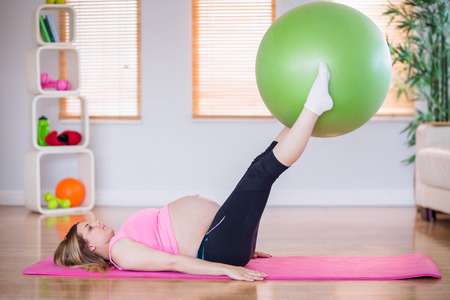Pregnancy Fitness

In this article, you will find:
How your body adapts
Your body changes to nurture the health of both you and your growing baby. The priority is to optimize blood flow and its supply of oxygen, fluid supply, nutrients, and temperature control to your baby. Just as your organs function to do this for you, they work at their maximum to do this for your baby.
Your heart rate increases to handle the larger volume of blood it pushes throughout the body in order to reach the fetus. Heart rate increases as the pregnancy goes on. By the third trimester, your heart rate can actually increase 10 to 15 beats per minute to accommodate the baby. This is demonstrated by an increase in pulse rate both at rest and while exercising.
Your blood increases in many ways: number of cells, volume (overall amount of fluid), and size of vessels. This allows it to more efficiently transport oxygen and nutrients to both mother and baby. Blood can also become slightly thicker, as it is carrying more nutrients and cells. This requires drinking increased amount of fluids to maintain proper blood flow.
Breathing can sometimes seem like work in pregnancy. Your breathing rate increases to supply oxygen to your baby and also to accommodate for your higher metabolism. Your body also becomes more sensitive to levels of humidity or change in air temperature, causing you to "overbreathe," or feel as if you are hyperventilating at times. Adding to your change in breathing is pressure on the breathing muscles (diaphragm and rib muscles) and lung space as your baby grows, making your lungs slightly smaller and less able to fully expand.
Temperature regulation is slightly impaired during pregnancy. Thicker blood and more red blood cells slow your body's natural cooling mechanism. Also, pregnancy hormones interfere with your normal thermostat that controls body temperature. This increase in temperature can be detrimental to a pregnancy, because research has shown that a fetus can develop abnormally if body temperature stays elevated for long. Therefore, you must avoid a rise in body temperature by not exercising in heat, wearing light clothing, and drinking cool fluids during exercise. If you have trouble judging your body temperature, check it with a thermometer while exercising; it should not go over 100 degrees. Exercising in heat also increases your risk of dehydration. Overheating should be avoided at all times, not just while exercising. It is for this reason that saunas, Jacuzzis, and hot tubs are prohibited during pregnancy.
Drinking more fluids is one of the most important changes you need to make to accommodate to pregnancy for many reasons, including preventing constipation, temperature regulation, maintaining increased blood flow, and higher breathing rate. Fluids are lost at increased amounts through digestion, sweat, in urine and stool, and through the lungs. Because your body system requires much more fluid when you are pregnant, it is very important to stay well hydrated.
During pregnancy, your body uses up its supplies of glycogen (stored energy) faster. The hormone changes of pregnancy require that you use carbohydrates as an immediate energy source during exercise, especially when exercise lasts longer than 45 minutes. With regular exercise, you need at least 400 to 500 more calories per day after the first trimester than you were eating before.
Body System Changes During Pregnancy
| Body System | Change |
| Heart | Increased rate |
| Lungs | Increased breathing rate, decreased lung space |
| Blood | Increased cells, thickness, volume |
| Blood vessels | Increased size and number |
| Metabolism | Increases |
| Body temperature control | Impaired |
| Glucose supplies | Used more quickly |
WARNING Dehydration can cause decreased oxygen and nutrient supply to the baby, overheating, and early labor.
Your growing baby experiences the same responses to exercise you do: heart rate and temperature go up and blood sugar supply goes down. Remember this as you are exercising and considering whether to run that extra mile in the heat (don't!). Also, when you exercise, more of your blood is going to the muscles to allow them to work, taking some away from your baby. Therefore, if you are a competitive or professional athlete who wants to stay as fit as possible, it is recommended to split your workout into two 30- to 45-minute sessions at two different times of the day to decrease an overload of stress on the baby.
Exercise Guidelines During Pregnancy
- Be able to say three sentences in a row without getting short of breath.
- Do not allow yourself to feel hot for more than a few minutes.
- Make sure you have carbohydrate snacks available for each 30 to 45 minutes of exercise.
- Drink at least 1/2 cup of fluid for every 10 minutes of aerobic exercise or 15 minutes of light exercise.
- Be aware of changes in balance and increased fall risk; avoid uneven or slippery terrain.
- Rest if you have pain or feel weak or tired.
- Always cool down for 5 to 10 minutes before resting completely.
- During the last trimester, do not lie on your back for more than five minutes.